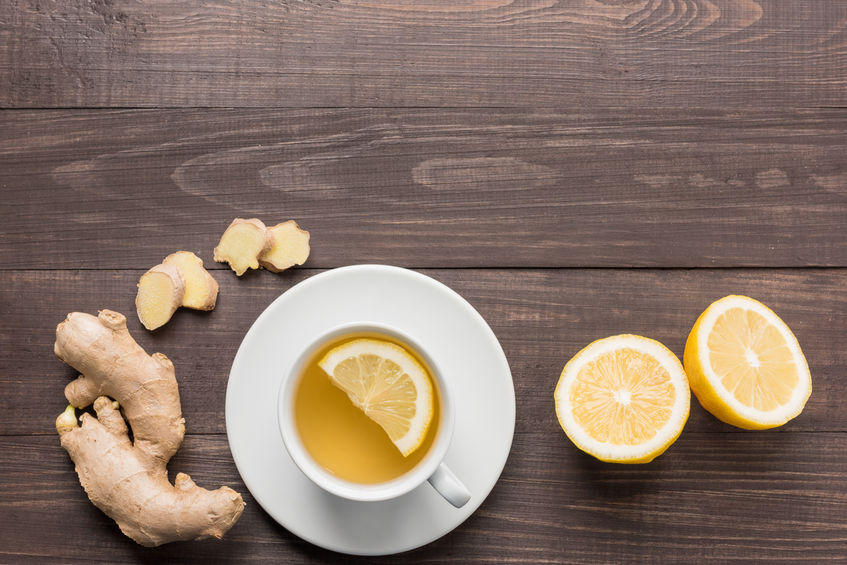I absolutely love ginger.
The zingy flavor goes so well with holiday cooking, it adds warmth to my dishes, and let’s not forget the myriad of health benefits that this unassuming little root offers.
Plus, with Thanksgiving and Christmas just around the corner, it’s the perfect excuse to eat more of it 🙂
Ginger is from the Zingiberaceae family – the same family that cardamom and turmeric belong to. It’s been used for thousands of years in China and India as a health remedy and tonic. And it’s been incorporated into just about every asian cuisine that I enjoy eating.
Here are some of the science-backed reasons why you need to be eating ginger too (if you’re not already).
Ginger’s Impressive Health Benefits
- Ginger contains a bioactive compound called 6-gingerol that is responsible for it’s impressive anti-inflammatory, anticancer and antioxidant properties.¹⁻² This means that ginger is beneficial for memory, brain function, eye health, heart health and strengthens your immune system.
- Ginger can help relieve joint pain caused by osteoarthritis. A 2001 study followed 247 patients with osteoarthritis who were given purified ginger extract. After 6 weeks, patients reported a significant reduction in knee pain.³
- Ginger is effective at reducing nausea and pregnancy-related morning sickness, and is especially effective when combined with vitamin B6.⁴⁻⁶ Of course, if you are pregnant, speak to your doctor before eating large amounts of ginger as a precaution.
- Recent research suggests that ginger may also be effective at lowering blood sugar.⁷
- Studies on both animals and humans have found that ginger supports healthy digestion, improves and restores your gut microflora and assists with gastric emptying.⁸⁻⁹
- When it comes to period cramps, ginger can also be used as a natural alternative to painkillers. Some studies even suggest that it is just as effective as ibuprofen.¹⁰
- Studies also suggest that ginger is great at fighting infection, gingivitis and periodontitis thanks to it’s anti-fungal and anti-microbial properties.¹¹
Okay, we could go on and on about the health benefits of ginger, but I don’t want to bore you. You’re going to have to trust me when I say that there is plenty of science that shows how wonderful ginger is.
Best Ways to Get Your Ginger-Fix
Head down to your local grocer and see if they stock any of the following – preferably organic:
- Fresh ginger (great for juicing)
- Ginger powder (perfect for curries)
- Ginger extract
- Ginger tea
- Ginger oil
Sometimes I make lemon ginger tea in the morning, which is super simple. Just a slice of lemon and a slice of ginger, and I’m set!
I know that sometimes it’s a little hard to figure out how to add more ginger into your life. That’s why I’ve included a list of some tasty recipes that make use of ginger for you to try:
- Anti-Inflammatory Lemon Ginger Turmeric Ice Tea
- Ginger Honey Glazed Carrots
- Ginger, Edamame and Chicken Pilaf
- Zingy Ginger Chicken Curry
- Healthy Kale and Quinoa Salad with Ginger-Curry Vinaigrette
I just want to make a note about cooking oil: you can always opt for healthy oils like olive oil, coconut oil or avocado oil where possible. And opt for homemade stock instead of artificial stock cubes too!
Before you go… here’s a special treat. Looks like you guys are falling head-over-heels for our handsome office dog, Buddy. Jeanne’s taking him on a break this Thanksgiving long weekend. Here he is in the car enjoying the beautiful scenic drive to the Okanagan.
This wouldn’t be a proper Friday without some photos from the team. I hope you enjoyed today’s post and have a similarly gorgeous weekend!
Are you a fan of ginger? And how do you eat it? Let us know in the comments below 🙂


Sources:
- http://www.ncbi.nlm.nih.gov/pubmed/25230520
- https://www.ncbi.nlm.nih.gov/pubmed/27525509
- http://www.ncbi.nlm.nih.gov/pubmed/11710709
- https://www.ncbi.nlm.nih.gov/pubmed/17621727
- https://www.ncbi.nlm.nih.gov/pubmed/15051552
- https://www.ncbi.nlm.nih.gov/pmc/articles/PMC3995184/
- https://www.ncbi.nlm.nih.gov/pmc/articles/PMC4277626/
- https://www.ncbi.nlm.nih.gov/pubmed/23765551
- https://www.ncbi.nlm.nih.gov/pubmed/18403946
- https://www.ncbi.nlm.nih.gov/pubmed/19216660
- https://www.ncbi.nlm.nih.gov/pubmed/18814211





Evie
October 8, 2016 , 8:45 pmI flavour my home made kombucha with grated ginger and lemon juice, quite delicious.